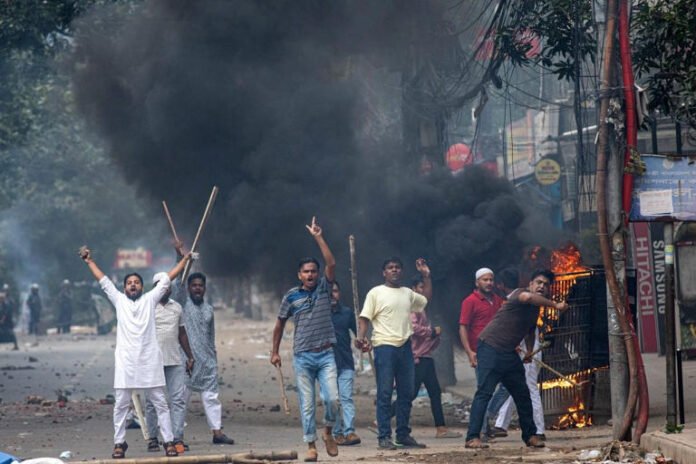The ongoing unrest in Bangladesh took a deadly turn as anti-quota protesters attacked homes of Hindus, resulting in the deaths of two individuals, including a prominent Hindu Awami League leader. The incident has intensified concerns over minority safety and political stability in the country.
Background of Anti-Quota Protests
The anti-quota protests in Bangladesh have been a significant political issue over the past few months. Protesters are demanding the abolition of a controversial quota system in government jobs and educational institutions. The quota system, originally designed to provide opportunities for marginalized groups, has faced criticism for allegedly perpetuating inequality and corruption.
The movement has garnered widespread support from students and civil society members, who argue that the quota system is unfair to meritorious candidates. However, the protests have also given rise to tensions and violence, particularly affecting minority communities.
The Attack
On a fateful night, the anti-quota protesters’ anger boiled over into violence targeting the Hindu community. A mob, reportedly comprising hundreds of agitators, descended upon a predominantly Hindu neighborhood in the Narail district. Armed with sticks, stones, and makeshift weapons, the attackers vandalized homes, looted properties, and set fire to several houses.
Among the victims was a respected Hindu leader of the Awami League, a prominent political party in Bangladesh. The leader, along with another Hindu resident, was brutally killed in the violence. Eyewitnesses recount the horror of the attack, describing how the mob’s fury seemed to target individuals based on their religious identity.
Reactions and Responses
The incident has sparked widespread outrage and condemnation from various quarters. The Awami League, led by Prime Minister Sheikh Hasina, has called for swift action against the perpetrators. In a statement, Prime Minister Hasina expressed deep sorrow over the incident, vowing to bring those responsible to justice. She also reassured the Hindu community of the government’s commitment to their safety and security.
Human rights organizations and minority advocacy groups have decried the attack as a blatant act of communal violence. The Bangladesh Hindu-Buddhist-Christian Unity Council has demanded immediate government intervention and increased protection for minority communities. They have also called for a thorough investigation into the incident and stringent punishment for those involved.
International bodies and foreign governments have also expressed concern over the rising communal tensions in Bangladesh. The United Nations Human Rights Office urged the Bangladeshi authorities to ensure the protection of all citizens, regardless of their religious or ethnic background. The U.S. Embassy in Dhaka issued a statement condemning the violence and urging peaceful resolution of disputes.
The Impact on Minority Communities
The attack has instilled fear and insecurity among the Hindu community in Bangladesh, which constitutes a minority in the predominantly Muslim nation. Historically, Hindus in Bangladesh have faced discrimination and violence, and incidents like this exacerbate their vulnerability. The latest violence underscores the need for more robust measures to protect minority communities and uphold their rights.
The socio-political fabric of Bangladesh is also at risk, as such incidents of violence can further polarize communities and disrupt the country’s unity. The anti-quota protests, while addressing legitimate grievances, risk being overshadowed by communal tensions if not managed appropriately.
The Way Forward
In the aftermath of the attack, there is an urgent need for the Bangladeshi government to restore order and ensure justice. Law enforcement agencies must act decisively to apprehend the culprits and prevent further violence. Strengthening community policing and intelligence gathering can help in preempting such attacks in the future.
Moreover, political leaders and civil society must work together to address the root causes of the anti-quota protests. Meaningful dialogue and reforms can help in resolving the grievances of the protesters without resorting to violence. It is crucial to promote an inclusive approach that respects the rights and dignity of all citizens.
In addition, the tragic attack on Hindu homes by anti-quota protesters in Bangladesh highlights the pressing need for communal harmony and protection of minority rights. As the nation grapples with these challenges, it must strive to uphold the principles of justice, equality, and human rights for all its citizens.

